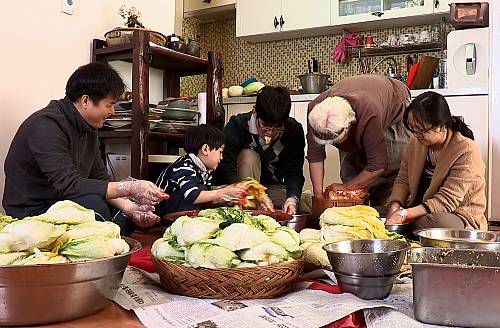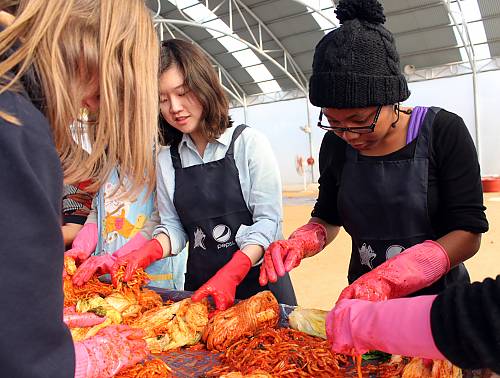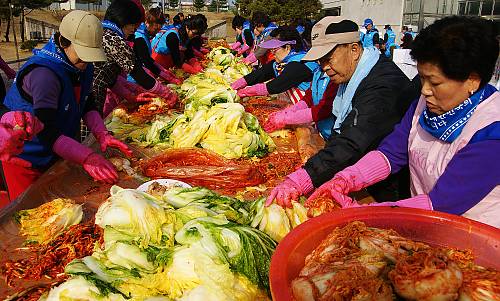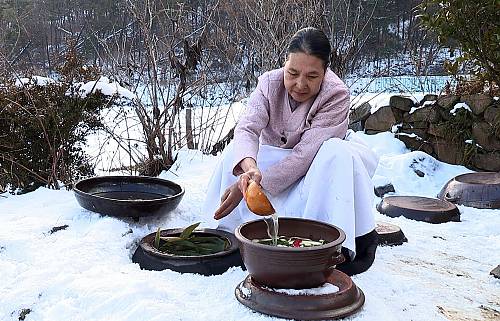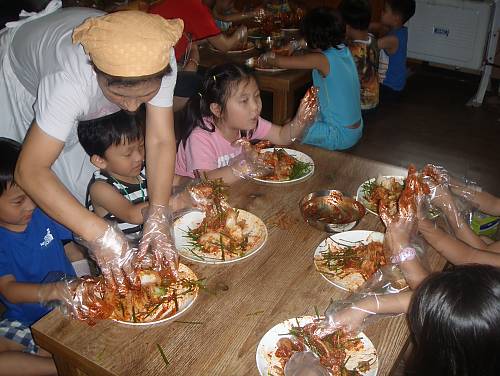Kimjang and the Sharing of Kimchi
a Korean eco-practice of sharing among neighbors
inspired by UNESCO and EcoCiv Korea
"Every year, Koreans all over the globe participate in kimjangs, working together to produce large batches of baechu kimchi to ensure an ample supply for long, cold winters." It is a sign of hope for a more humane, sustainable world: an Ecological Civilization where people live with respect and care for one another and the larger community of life, with no one left behind. Large structural changes, of the kind advocated by EcoKorea (see below) begin with our appreciating small practices, undertaken by many people, that set the stage for the large ones.
These practices are not simply means to larger ends, they are modes of spirituality in their own right: ways of being connected to one another, in neighborly ways, that transcend the callousness of linear economics, moving toward more circular economies where, in the words of Dr. Keunhwa Jung, "the social economy and the shared economy based on the local community can become the main agents." Local practices such as kimjang might also be relevant to early childhood education, Dr. Yunjeong Han puts it well: "The values of progressive education" promote "cooperation rather than competition, ways to acquire knowledge instead of knowledge itself, and education that fosters creativity and ecological literacy." I cannot help but wonder if, in some small way, the very practice of kimjang, if done creatively as part of an educational project among children, might foster that very cooperation, creativity, and ecological literacy, of which she speaks. One thing for sure, the outcome of the practice, kimchi itself in its countless varieties, is delicious, and there's a powerful place for deliciousness in a just and sustainable world. In he spiritual alphabet used by the Cobb Institute (see below), "C" is for connection and "J" is for both justice and joy.
- Jay McDaniel, 8/13/2022
* dialogue between Dr, Kenunhwa Jung and Dr. Yunjeong Han, offered by EcoCiv Korea
These practices are not simply means to larger ends, they are modes of spirituality in their own right: ways of being connected to one another, in neighborly ways, that transcend the callousness of linear economics, moving toward more circular economies where, in the words of Dr. Keunhwa Jung, "the social economy and the shared economy based on the local community can become the main agents." Local practices such as kimjang might also be relevant to early childhood education, Dr. Yunjeong Han puts it well: "The values of progressive education" promote "cooperation rather than competition, ways to acquire knowledge instead of knowledge itself, and education that fosters creativity and ecological literacy." I cannot help but wonder if, in some small way, the very practice of kimjang, if done creatively as part of an educational project among children, might foster that very cooperation, creativity, and ecological literacy, of which she speaks. One thing for sure, the outcome of the practice, kimchi itself in its countless varieties, is delicious, and there's a powerful place for deliciousness in a just and sustainable world. In he spiritual alphabet used by the Cobb Institute (see below), "C" is for connection and "J" is for both justice and joy.
- Jay McDaniel, 8/13/2022
* dialogue between Dr, Kenunhwa Jung and Dr. Yunjeong Han, offered by EcoCiv Korea

